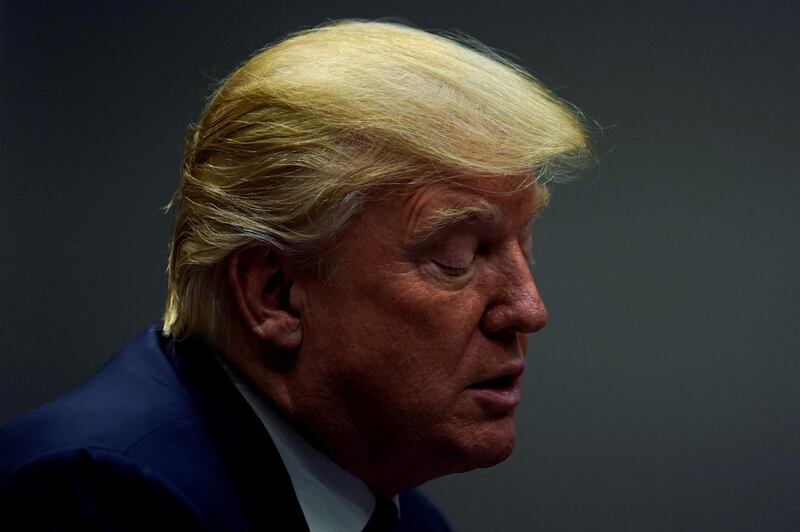Donald Trump's decision to cut arms to Kurdish forces in Syria may have pleased the Turkish government, but it also showed the extent of Washington's seriousness in containing Iran in the Middle East. The fact is that the United States does not appear to have any systematic plan, beyond Mr Trump's rhetoric, to counter Tehran's regional influence.
Why does the decision on the Kurds matter? Because it shows that the US projection of power in eastern Syria, through a number of military bases it established there, was a thing of the moment. The bases were set up to provide logistical support for the operations against ISIL, but could also have been used to better control the Iraqi-Syrian border, in that way leaving open the possibility in certain circumstances of preventing the passage of pro-Iran militias from one country to the other.
In mid-November US defence secretary James Mattis was asked about whether American forces would remain in Syria. He was evasive, but he also pointed out: "We're not just going to walk away right now before the Geneva process [to end Syria's crisis] has cracked." However, Mr Trump's promise last week that he would stop arming Kurdish groups made this relative.
If the administration has taken the decision to stop arming the Kurds, that means it is not particularly concerned with guaranteeing a friendly environment for US forces deployed in eastern Syria. It also means that it is implicitly favouring the Syrian regime, which is keen to take back large swathes of the territory from Kurdish forces. This also happens to be an Iranian objective, so Mr Trump’s move doesn’t reflect concern with Iran, let alone suggest the US is planning to remain for the long haul in Syria.
One might argue that a deployment in Syria is hardly a relevant barometer of US seriousness with regard to Tehran. But if retaining a presence in a strategic region through which Iran can send forces into Syria and even Lebanon does not qualify as such, it’s hard to determine what does.
______________
Read more from Michael Young
[ Lebanon must not get caught in the crossfire between Hizbollah and its critics ]
______________
Nor did Mr Mattis' remarks about the Geneva process make much sense. Washington has done almost nothing under Mr Trump to have a say in an inter-Syrian dialogue, and last July the US president cut off military aid to Syrian rebels, indicating he was not particularly keen to retain leverage in Syria. Indeed, the Americans have largely remained marginal in the Astana process to de-escalate the Syrian conflict, which brings together Russia, Iran and Turkey. Nothing indicates that's about to change.
Mr Trump’s actions elsewhere have been devoid of substance. The president has done nothing to mediate in Arab disputes, in that way helping to create a united Arab front that could better contain Iran. In fact, he has remained entirely silent on Egypt’s quiet opening to the Assad regime in Syria, a move that has significantly reinforced Iran’s position there. If anything, Mr Trump has also tolerated ambiguity in Iraq and Lebanon, both countries in which Iran’s allies have maintained significant influence.
The reality is that events in the Middle East appear to be very far from the president's preoccupations. For decades the region benefited from the time and commitment of US presidents, until Barack Obama made it clear that he would not follow their lead. The result was full-scale US disengagement from the region, which Mr Trump shows no real intention of reversing, even if his public statements suggest the contrary.
The Iranians, like the Russians, and indeed many of Washington’s Arab allies, appear to realise this. The Saudis may not have given up on Mr Trump, but improved ties with Moscow recently to hedge their bets, when King Salman visited Russia. They did not regard that opening as something that might threaten the relationship with the Americans.
Egypt’s Abdel Fattah El Sisi is also following a path independently of the Americans. His ties with Russia have greatly improved, and the Egyptian president has also implied through his actions in Syria that Iran’s regional reach is not something that prevents him from sleeping. Like the transactional Mr Trump, Mr Sisi will take what he can from Washington, but will readily look elsewhere when the Americans fail to deliver.
The reality is that the Arab world is deeply divided (hardly a surprise), but that any cohesive strategy to contain and counter Tehran’s regional influence requires precisely the opposite. The Trump administration, if it is serious about Iran, would make diplomacy to unify Arab ranks a priority, one involving Mr Trump personally. Yet at time when the president hardly has any regard for his own secretary of state, and when foreign policy is being driven by former military officials, this seems a pipe dream.
What Mr Trump never understood, or wanted to, was that Syria is at the heart of the Middle East’s dynamics. One can’t change the balance of power in the region and not have a Syria policy. But Mr Trump, like Mr Obama before him, always refused to look beyond ISIL, showing a poverty of expectations. This is hardly the man who will cut Iran down to size.





